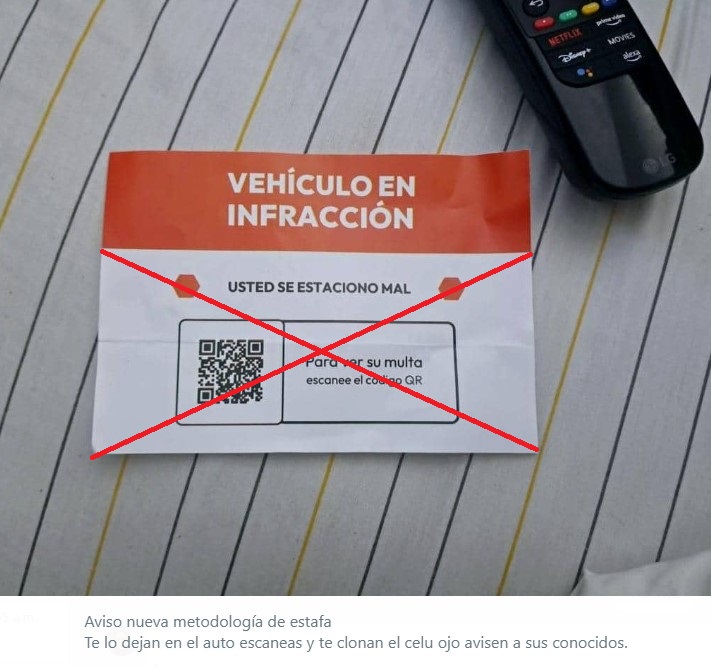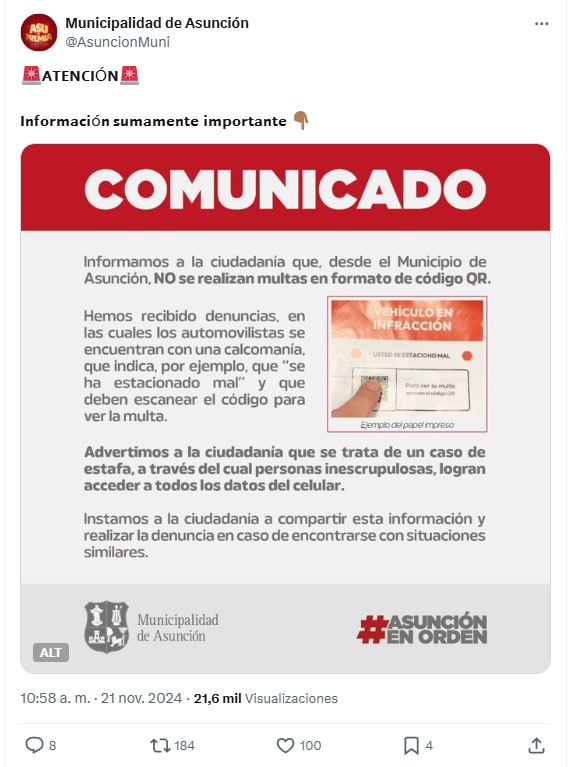Does Traffic Fine Notice seek to scam drivers by scanning a QR code?
An image of a notice circulating on WhatsApp that warns drivers of a vehicle violation and says “You parked incorrectly” and immediately below and next to a QR code “To see your fine, scan the QR code.” The photo is accompanied by the following message: «Notice new scam methodology. “They leave it in your car, you scan it and they clone your cell phone, notify your acquaintances.” It is certainly a attempted fraud, but that does not happen in Venezuelanot until at least November 26, 2024.

On the weekend of November 23, the image being verified was spread on WhatsApp. An Internet search shows that a notice that notifies a traffic violation is false and seeks to defraud drivers, but this does not happen in Venezuela or at least until November 26, the date of publication of this note.
The format is the same in all cases. The (fake) notice has a red stripe at the top that reads “vehicle in violation” in white letters and the rest of the page has a white background with black letters and a QR code.
The scam modality is new and is occurring in locations in Argentina, Paraguay and Spain, according to reports from information portals. The case was detected in the city of Salta, Argentina, where residents found the sticker or a piece of paper rubbed on the windshield wipers of their cars parked on the street, which caught their attention. The situation went viral on social networks, which demanded a statement from the Public Prosecutor’s Office of Salta, an organization that warned that it was a case of qrhishingpoints out the half argentine Infobae in a post dated November 21, 2024.
He qrhising It is a technique of phishing via QR codes. By scanning the code, “the user is directed to a fake website, where they ask for credentials or sensitive information to use that data for malicious purposes (commit other attacks, impersonate, subscribe the victim to paid services…)” , reads on the site Never Off Technology.
Or take full control of the cell phone as warned in a report from América TV, from Argentinawhich explains how the scam proceeds and who is behind it. When you scan the QR, the address of an application appears on the cell phone screen and when you enter, the phone number is requested. When you place it, it indicates that you received a WhatsApp code that, when loaded, opens the way for cybercriminals to have access to the user’s information contained on the phone.
The diary The Nation reported that the Public Prosecutor’s Office created a spot to alert citizens about the situation and take certain recommendations into account.
As a preventive measure, the city of Buenos Aires and other Argentines published information alerting citizens about the false fine that is known through scanning a QR code.
Important information about a new type of scam.
In recent days, stickers with false traffic violations have appeared on vehicles. You are invited to scan a QR code to obtain information about the alleged fine, but it is a new… pic.twitter.com/RZaUFRrBfA
— Buenos Aires City (@gcba) November 21, 2024
In Asunción, Paraguay, this practice of placing notices on vehicles notifying that they are parked incorrectly was also identified. The portal Paraguay News notes that “the municipality recalled that it does not use QR codes to issue fines and that all processes related to traffic fines are managed through official channels.”
The statement from the Municipality of Asunción urges citizens to make the respective complaint.
Cases of this attempted scam have been reported not only in the south of South America, and as of the date of writing this note there have been no formal complaints to the competent authorities, but also in Spain. Bilbao and Santa Cruz de Tenerife They have registered cases of alleged traffic fines that seek to scam drivers, report Antenna 3.
Information about this new type of scam through QR code scanning has gone viral in Latin America and Spain, so authorities, even in countries that have not yet been affected, have put the population on alert to avoid falling. in the trap, as in the case of Medellín, in ColombiaFor example.
The media have also taken on the task of denying the notice with the traffic violation that is read through the QR code, before it reaches their countries.
The notice with a QR that is placed on the windshield of vehicles warning of an infraction for being parked incorrectly is a trap, so the scam alert that it entails if the code is scanned is true. Cases have been reported in locations in Argentina, Uruguay and Spain, although this new modality has not been seen in Venezuela. Or at least not until November 26, 2024.

